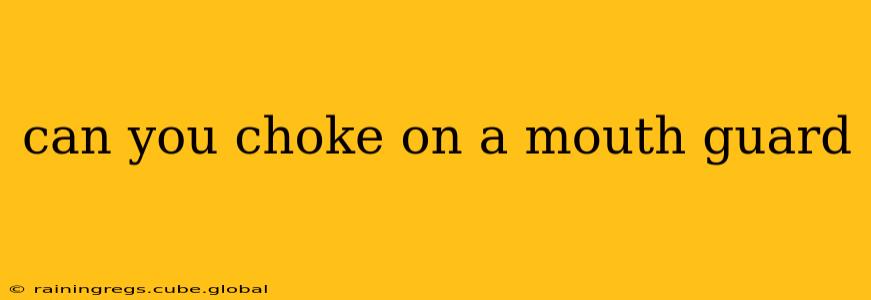Can You Choke on a Mouthguard? Understanding the Risks and Prevention
While rare, it's possible to choke on a mouthguard, particularly if it's improperly fitted, damaged, or used incorrectly. This article will explore the potential risks, answer frequently asked questions, and provide guidance on safe mouthguard usage.
What are the risks of choking on a mouthguard?
The primary risk of choking on a mouthguard stems from its size and material. A poorly fitting mouthguard that's too large or bulky could obstruct the airway, especially if it slips out of place during activity. Additionally, if a mouthguard is damaged—for example, if a piece breaks off—this fragment could become lodged in the throat, potentially causing choking. The material itself, while generally safe, could present a choking hazard if broken down into smaller, easily-swallowed pieces.
Can a child choke on a mouthguard?
Children are at a slightly higher risk of choking on a mouthguard than adults due to their smaller airways and less developed coordination. A poorly fitted mouthguard is a significant concern for children, and ensuring proper fit and supervision during activities is crucial. Always choose a mouthguard specifically designed for a child's age and size.
What types of mouthguards pose a greater choking risk?
Stock mouthguards, which are mass-produced and not custom-fitted, pose a higher risk of choking than boil-and-bite or custom-fitted mouthguards. The lack of personalized fit increases the chance of the mouthguard shifting and obstructing the airway. Damaged mouthguards, regardless of type, present an increased choking hazard due to the potential for broken pieces.
How can I prevent choking on a mouthguard?
- Proper Fit: This is paramount. A mouthguard that's too large or too small increases the risk of it shifting and obstructing the airway. Boil-and-bite mouthguards allow for a more customized fit than stock mouthguards, and custom-fitted mouthguards offer the best fit.
- Regular Inspection: Check your mouthguard regularly for any signs of damage, such as cracks, tears, or broken pieces. Replace a damaged mouthguard immediately.
- Proper Use: Always wear your mouthguard correctly. Ensure it's securely in place before participating in any activity.
- Supervision (Especially for Children): Closely supervise children while they're wearing a mouthguard, particularly during sports or activities that could cause the mouthguard to dislodge.
- Choose the Right Mouthguard: Select a mouthguard appropriate for your age, activity level, and mouth size.
What should I do if someone is choking on a mouthguard?
If someone is choking on a mouthguard, immediately perform the Heimlich maneuver. If you are not trained in this life-saving technique, call emergency services immediately and follow their instructions. Time is of the essence in such situations.
In conclusion:
While choking on a mouthguard is uncommon, it's crucial to prioritize safety. Choosing the right mouthguard, ensuring proper fit, and regularly inspecting it for damage are vital steps in minimizing this risk. Always seek medical attention if choking occurs. This information is for educational purposes only and does not constitute medical advice. Consult a healthcare professional or dentist for personalized guidance on mouthguard selection and use.
